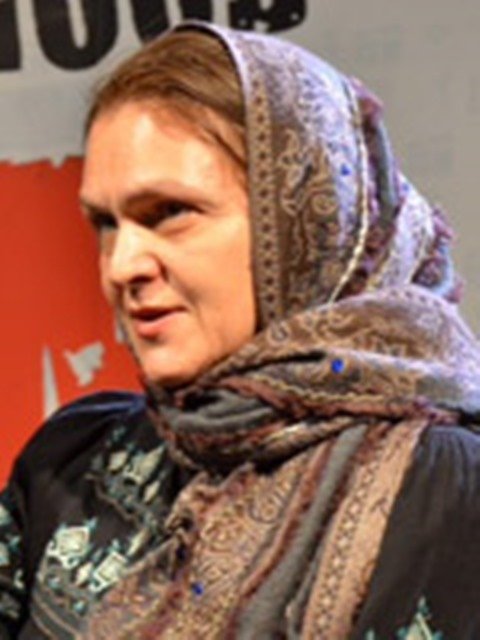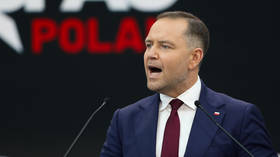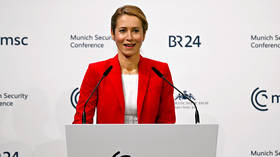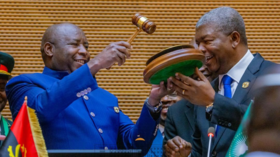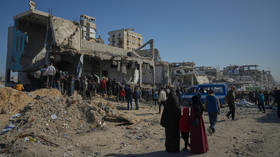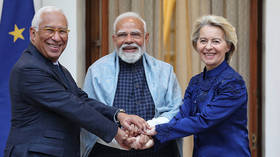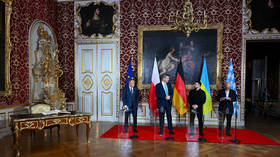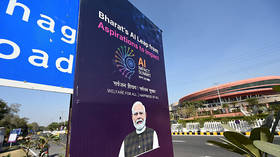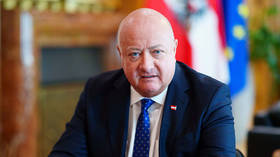Why the West has trouble understanding Iran’s political language
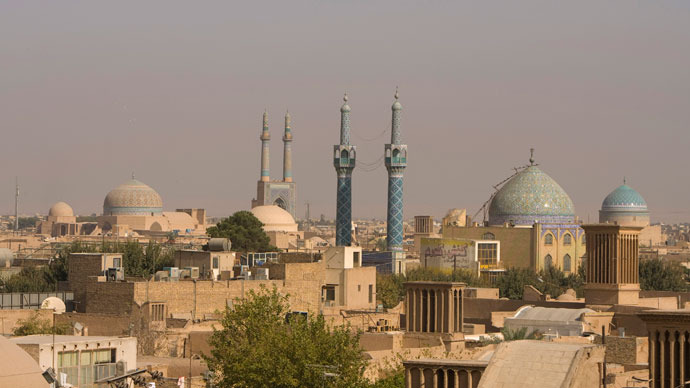
The outcome of the presidential election in Iran will have a resounding effect across the Middle East and the whole world. While the West dubs the poll unrepresentative, little is done to understand the nature of Political Islam which governs the nation.
The previous 2009 elections came amid a large-scale opposition campaign to review the voting results – but that was before the Arab Spring, while the future elections have dovetailed with a crisis of the revolution in Egypt, a war in Syria and a wave of unrest in Turkey.
In 2009, the Muslim world saw the US as its archenemy, and Iran – mostly as a friend: it persevered in its nuclear program, disagreed with Americans, advocated Palestine’s interests and backed both Hamas and Hezbollah. However, with the Syrian conflict now in full swing, the Muslim world has been virtually forced into a Sunni vs. Shia standoff.
This makes the upcoming vote a turning point for Iran, the Middle East and the whole world.
Now that the US has already panned the elections as fraudulent, will the opposition resort to the methods it used back in 2009? Will it lead to an upheaval in the country? Will the US offer a helping hand to the opposition? We shall find out very soon.
Few in the West have any idea at all of the Iranian political landscape.
To make matters clear, they have labeled the contenders ‘conservatives’ and ‘reformists’ – a deeply flawed classification.
The leading reformist, Akbar Hashemi Rafsanjani, who was disqualified from the presidential race by the Guardian Council, and ex-president Mohammed Khatami, who reportedly decided not to run, are high-ranking Muslim clericals.
‘Conservatives’, on the contrary, hold strongly secular views. It is Khatami who once introduced the idea of the Dialogue of Civilizations as a response to Samuel Huntington’s Clash of Civilizations. But when he met the Spanish Queen, he made a point by refusing to shake her hand.
Another reformist, Ayatollah Rafsanjani, leads an important clerical council in the country. His son is a pistachio tycoon, but the ayatollah still lives a modest lifestyle not far from Imam Khomeini’s house in an ex-slum called Jamaran.
An Iranian conservative, President Ahmadinejad in many ways owed his victory in the previous polls and his popularity to his unassuming attitude. When he was a city mayor, he wore a casual jacket and lived in a poor neighborhood. At the same time, a university professor, he could easily plunge into discussing philosophical matters, shocking the political elite into a stupor.

Conservatives in Iran are against the very symbol of what the West calls a conservative regime – putting clericals into high offices.
Now the outcome of the Iranian election is pretty unpredictable – for a number of reasons.
Political preferences of Tehran’s residents and the rest of the country are very divergent: while in the capital the politically active intellectuals would like to see a ‘consensus candidate’ at the helm, Iran on the whole is dominated by adherents of the Islamic Revolution – which stands for refusing to cooperate or enter into any agreements with the West. That’s why Tehran is by no means a thermometer of nationwide sentiments.
Iranians are a highly disciplined nation. And it’s not only about how millions instantly respond to political issues. It’s also about a high voter turnout and observers from all the candidates at the polls. I saw all of this with my own eyes in 2009.
Contrary to what the Western media say, an Iranian does not face a ballot of eight unfamiliar contenders.
Each candidate has a strong background and his own supporters.
A two-week debate offers all the runners an opportunity to answer questions on their vision of economy, politics and culture.
And while a Western viewer will say the debate would do better with a healthy amount of squabbling and wrangling, Iranians are happy with what they have. In Iran, they do not make a show of the elections. The debate enables a politically vocal majority to make their ultimate choice.
Nature of ‘political Islam’
But there is one more thing to remember. Most Iranians are constantly in touch with influential scholars, men and women alike, who know the sharia law and the Quran very well. In one family, husband and wife may well sign up to different schools of thought.
During the holy month of fasting and on holidays, Iranians invite these spiritual teachers to visit them and talk to their friends and family.
Such intellectual exchanges constitute a very important part of life in Iran – one that people abroad are unaware of. They’re not religious events or chatting over a cup of tea, or philosophy clubs – it’s just that people are constantly seeking intellectual discussion.
The scholars themselves have regular contacts with other scholars from their schools of thought and ayatollahs. It’s important to understand that in this respect there’s no uniformity in Iran – there are various schools of thought that don’t agree with either Imam Khomeini’s or Rahbar (The Supreme Leader of Iran) Khamenei’s ideas. (However, people who run for president have to more or less fall in line with Khamenei’s stance.)

There’s a consensus among the Iranian population on several key issues, such as the fact that the Islamic Revolution offered a new path for the people; that Iran has a right to its nuclear program and development; and that women’s rights are more respected in Islam than in Western law, which is inferior to Sharia law. The rest, like mullahs’ role in politics, the necessity of theocratic rule, the right to protest and dissent, and various cultural and behavioral phenomena, are considered to be topics open for debate. In Iranian people’s experience and tradition, it is necessary to regularly discuss such issues with scholars in order to comprehend them more fully.
A scholar is a central figure for seminars of this kind, but he or she is not a priest and definitely not a deity.
These ties between people – strong, but unseen by the outsiders – pervade Iranian society, strengthening it.
That’s what the Iranians mean by “political Islam”. It existed before the Islamic Revolution, secured its success, allowed dozens of millions of people to receive education and accounted for the country’s rapid progress in scientific and technological spheres.
It’s impossible to tell which school of thought a person adheres to simply by the way they look. For example, public servants of any kind all wear strict hijabs or ordinary suits, but that doesn’t mean they all follow the same school of thought. It doesn’t even mean they are religious or indicate which party they support.
Foreigners assume that Iranian women that wear make-up and have their hair done are somehow protesting against the regime, and find themselves at a loss when they see these same women in mosques. And they are completely stupefied when they see women in strict hijabs taking part in demonstrations. Iran is, indeed, a mystery.
Illegitimate and unrepresentative or..?
So who will be elected the country’s 7th president in the 11th presidential elections heavily depends on this complex mechanism – political Islam. The US State Department has already declared the election illegitimate, claiming that the candidates “do not represent the people”.
Let’s try to determine if that is the case. It should be mentioned that Iranian politics is an exotic and unusual thing for Western people. In order to make sense of it, it is important to know about a politician’s origins, his occupation before and after the Iranian Revolution, his status, which is far more challenging than distinguishing between the Western bipartisan systems, where the differences between the parties boil down to their stances on taxes, abortion and gay rights.
The so called “conservatives” include five candidates: Saeed Jalili, Ali Akbar Velayati, Mohammad Bagher Ghalibaf, Gholam-Ali Haddad-Adel, and Mohsen Rezaee.
Saeed Jalili
Experts say Saeed Jalili is most likely to win. But predictions don’t always work in Iran. In 2005, analysts didn’t even notice Mahmoud Ahmadinejad in the first round, but in the second round he beat Rafsanjani himself.
Saeed Jalili is 47 years old, making him the youngest of the eight candidates. He was born in Mashhad, a home of many Shia holy places. Many revolution minded students came out of this city. He is the main negotiator for the nuclear program, so Iranians hear his name all the time, since the media in Iran and all over the world follow this topic closely.
In 2007, he became secretary of the Supreme National Security Council, making him the chief negotiator for Iran’s nuclear program. With the country’s nuclear policy a topic of intense interest at home and abroad, he is a household name in Iran.

Jalili holds a Ph.D in political science and philosophy from Imam
Sadeq University in Tehran.
During the war, he served as a member of the Basij volunteers of the Army of the Guardians of the Islamic Revolution, which certainly wins him some points with the people. He was senior director of policy planning in the office of Iran’s Supreme Leader, and also served as Deputy Foreign Minister.
He didn’t announce his candidacy until very recently. Despite being a member of the Front of Islamic Revolution Stability, he will run as an independent candidate.
Experts say that even though he never was a policy maker per se, he has a strong political will and knows what tough confrontation is like. But this won’t win him people’s votes. However, the fact that a number of registered candidates withdrew in favor of Jalili, shows that he has a serious chance to win.
In the first round of debates, Jalili promised to stand strong against “the arrogant Western countries”. The Iranian people can identify with this, they understand his stance and promise to avoid the policy of compromise. While the West sees it as “entrenched conservatism”, for the Iranians this represents the continuity of Iran’s resistance policy, which most of the people support.
Jalili also commented on a very important issue: “We registered 850 thousand new marriages in the last year, so we need to come up with a housing program in order to accommodate the needs of these new families.” So basically he is going to focus on making sure that young couples can afford to buy or rent a place. In Iran, this is considered a high priority issue.
He also mentioned renovation of old buildings. Few people outside Iran know that Iranians blame the shah for destroying Tehran’s historic streets. Apparently only the Mahdi is allowed to “make streets straight”, so basically the shah played the Mahdi.
Ali Akbar Velayati

Some experts had declared Ali Akbar Velayati as the most likely winner.
Velayati is 67 years old. He was born in a small village outside
Tehran. He studied pediatrics in Tehran and Johns Hopkins
University in the US. He was arrested when he was 17 – this was
during the rule of Mohammad Reza Shah.
In the last two years he initiated a number of summits for Arab Spring leaders, which Iranians call “Islamic Awakening”. He was able to bring together representatives of many different groups – from Taliban to Salafi groups, HAMAS and Hezbollah. Politicians, charismatic leaders, journalists from all over the world, female activists, and even revolutionary poets have come to his summits. Thanks to Velayati’s efforts, Iran has stayed the leader of the Arab revolution.
He used to be a Minister of Foreign Affairs, and today he is the foreign affairs advisor to the Supreme Leader of Iran.
Velayati is part of the “2+1” coalition (Velayati, Ghalibaf, and Haddad-Adel). There is still a possibility that they will withdraw in favor of Jalili. Velayati has already endorsed him.
Bagher Ghalibaf
One of the most vibrant and hard-boiled contenders is Mohammad Bagher Ghalibaf.
Ghalibaf, 51, was also born in Mashhad to a Kurdish father. In Iran, contrary to what Western propaganda is saying, the national/ethnic issue is a minor one, so all the attempts to use it to spur turmoil have failed. Khamenei, for instance, is Azerbaijani.

Previously, Ghalibaf used to stand at the helm of the Iranian police. After that, he headed the Islamic Revolution Guards Corps and was the Iranian Army Commander. Since 2005, he has enjoyed skyrocketing approval ratings as the Mayor of Tehran.
After he announced he’d be running as an independent candidate, a video went viral on the Internet showing Ghalibaf order troops to open fire on student protesters at Tehran University in 2003. Another similar video soon followed.
Ghalibaf has gone hard on his political rival Mahmoud Ahmadinejad, who won the 2005 elections. In an interview to Iranian news agency Tasnim he said, ‘Since when has the Holocaust become a leading issue of our foreign policy? Iran has never been against Judaism.’
That was his response to Ahmadinejad repeatedly raising this topic in public.
The truth of the matter is that Ahmadinejad has never spoken against Judaism or Jews and welcomed numerous rabbi delegations. Iran rejects Zionism as a fundamental ideology for the state of Israel, believing that it runs counter to Judaism.
Gholam Ali Haddad-Adel

Gholam Ali Haddad-Adel is unlikely to oppose the coalition.
Adel, 68, comes from Tehran. His daughter is married to the son of the Supreme Leader of Iran. In 2004-2008, he was the first secular Speaker in Parliament. He is a member of the Expediency Discernment Council (resolves differences between the Parliament and the Council of Guardians, headed by Rafsanjani) and the High Council of Cultural Revolution. Odds are that he will withdraw from the race to back the 2+1 coalition candidate.
With his degree in Physics (the most respected profession in
Iran), he also holds a PhD in Philosophy from the Tehran
University and is a prolific author. He served in various posts
like Vice Minister of Culture and Vice Minister of Education.
(Editore's note: Gholam-Ali Haddad-Adel was a candidate at
the time of the report's publication, but he withdrew from Iran’s
presidential race on Monday, semi-official Mehr news agency
reported.
"With my withdrawal I ask the dear people to strictly observe
the criteria of the Supreme Leader of the Revolution [Ayatollah
Ali Khamenei] when they vote for candidates," Haddad-Adel
said in a statement.)
Mohsen Rezaee
Mohsen Rezaee’s chances to win remain slim, in spite of his revolutionary past.

Rezaee is 58 and comes from Khuzestan. He was born into a semi-nomadic family of Lurs – a Persian ethnic group living in the Southwestern Zagros Mountains.
Shortly after the war with Iraq began, at the age of 27 he became the youngest commander to lead the Islamic Revolution Guards Corps, when his predecessor was killed in a terrorist attack. A hero of the war, he resigned from his post in 1981. For several years, he worked as Secretary of the Expediency Discernment Council.
Before the Revolution, he studied engineering at the Iran University of Science and Technology. In 2001, he earned a PhD in Economics.
In 2006, Argentina issued an arrest warrant for Rezaee and six more Iranians in connection with a 1994 suicide bombing of a Jewish cultural center in Buenos-Aires. Rezaee's son, Ahmad, defected to the United States and reportedly told officials that his father was behind the attack. Argentina has never asked Iran to extradite Rezaee.
This invalidates his presidential bid: in spite of his enormous popularity, a future president cannot be blacklisted by the Interpol or face a risk of arrest abroad.
Hassan Rouhani
The reformists have promised to unite behind one presidential nominee by June 8. As Aytollah Rafsandjani is no longer running for office, there are three possible candidates left.

Hassan Rouhani is considered to be the conservatives’ main rival, but he is a cleric and as such will not be able to provide serious competition.
Hassan Rouhani is 64. He was born in Sorkheh. He used to be a member of the Assembly of Experts, as well as the Expediency Council and the Supreme National Security Council. He has been the head of the Center for Strategic Research since 1992. He also took part in negotiations regarding Iran’s nuclear program.
He is an independent candidate, but the reformist leaders, former president Mohammad Khatami and Hashemi Rafsanjani, have supported his bid.
During the debates on the economic situation he raised the unemployment issue, saying there are 3 million unemployed people in Iran, 800,000 of whom hold college degrees.
Last week, during Rouhani’s campaign rally in Jamaran Mosque, several of his supporters were arrested. Saeedollah Badashti, the head of the youth branch of Rouhani’s followers, and others were arrested for chanting slogans in support of Mirhossein Mousavi and Mehdi Karroubi – the opposition candidates who led demonstrations after 2009 presidential election. Both of them are currently under house arrest.
"With your support, we will open all the locks which have been fastened upon people's lives during the past eight years. You, dear students and heroic youth, are the ones who support economic recovery and improving living standards. We will restore our country’s dignity," Rouhani said.
Mohammad Reza Aref
Mohammad Reza Aref is 61. He was born in Yazd. He was Vice-President under Khatami, from 2001 to 2005. He is an electrical engineer and a professor at the University of Tehran and Sharif University of technology. Currently Mohammad Reza Aref is a member of the Supreme Council of Cultural Revolution and the Expediency Discernment Council.
The polls show that Aref could become a successful candidate, but since the key reformist politicians have supported Rouhani he is likely to withdraw from the race.

During the debates Aref blamed Ahmadinejad for the country’s economic and political problems. He is in favor of privatization, which, in his view, is the only way to ensure economic growth. He hasn’t stop at criticizing Ahmadinejad, however, and proceeded to say that all of Iran’s problems are the conservatives’ fault. Nevertheless, he promised that as president, he would not tolerate criticism towards his predecessors, i.e. Ahmadinejad, Khatami, Mousavi and Rafsanjani.
The least known candidate is Mohammad Gharazi, who is also likely to withdraw from the race.
During a press conference before the debates Gharazi said, “I have no money or campaign managers, but I have an anti-inflation strategy”.
Gharazi is in Rafsanjani’s circle – he was Minister of Communication under Rafsanjani and Minister of Petroleum under Mousavi. He hadn’t been very politically active, so his bid for presidency was quite unexpected, and quite unexpectedly approved.
Out of 75 million Iranians, just over 50 million have a right to
vote in the upcoming presidential election that will be held on
Friday, June 14. Polling stations have been set up in schools,
mosques and colleges. All the candidates will have their
observers at every polling station.
The statements, views and opinions expressed in this column are solely those of the author and do not necessarily represent those of RT.
The statements, views and opinions expressed in this column are solely those of the author and do not necessarily represent those of RT.
